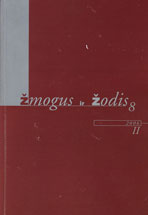Žmogaus ir žemės ryšys Kazio Bradūno eilėraštyje „ Vakaro maldoj"
The Relationship between the Human and the Land in the Poem "Vakaro maldoj" (In the Evening Prayer) by Kazys Bradūnas
Author(s): Aurimas MarkevičiusSubject(s): Literary Texts
Published by: Vytauto Didžiojo Universitetas
Keywords: land; Žemininkai (Lithuanian land poets); mystic; vision; sacral
Summary/Abstract: The Lithuanian poet Kazys Bradūnas, who disclosed diverse meanings of the land in his creation, is the most prominent poet of all the Žemininkai (Lithuanian land poets). The land is the most significant object in numerous poems constituting his creation. Literary critical works almost totally lack highlighting of the poem "Vakaro maldoj" {In the Evening Prayer) by Bradūnas, although the land sense is expressed very emphatically in it. The literary subject of the poem speaks from the standpoint of a landfarmer, even though he is an observer himself, rather than a real farmer. Land visions reach him through memories and through old people's narrations. The literary subject reaches arable fields in a transcendental way. An important element of the poem is the statė of the evening ąuietude, when the character can submerge in feelings. The human feels endless closeness to the land. Through the land, he is able to set a linkage with the generations of the past that ha ve also farmed it. The love for the land is so strong that the subject approximates the heathen ancestors in his way of thinking. The greatest anxiety and restlessness arises in the character due to his love for the land surpassing even love for God. Yet actually Bradūnas does not offer the reader to return to the pagan times; he only manifests that the Land has been as holy for Lithuanians as God is now. The poet also searches for a linkage between paganism and Christianity. The poem resembles the Lord's Prayer, yet it has a more intimate nature.
Journal: Žmogus ir žodis
- Issue Year: 08/2006
- Issue No: 2
- Page Range: 98-103
- Page Count: 6
- Language: Lithuanian

